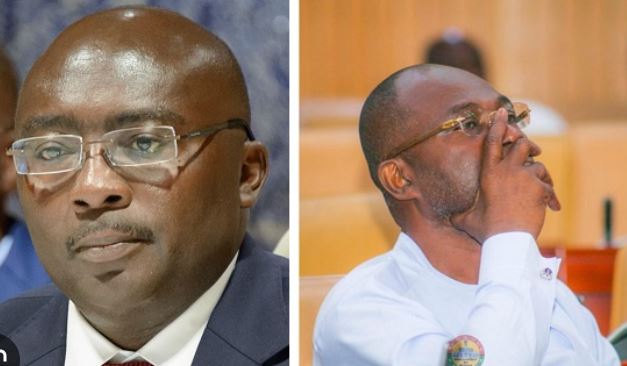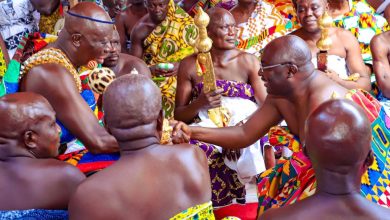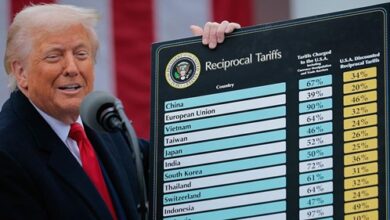Profile of Kennedy Agyapong and Dr. Bawumia, the two ‘terminators’ of NPP Presidential race
It is now a clear knowledge that the race to New Patriotic Party’s Presidential election is between Mr. Kennedy Ohene Agyapong and Vice President, Dr. Mahamadu Bawumia.

It is now a clear knowledge that the race to New Patriotic Party’s Presidential election is between Mr. Kennedy Ohene Agyapong and Vice President, Dr. Mahamadu Bawumia. Mr. Alan Kyerematen was expected to give the vice president a close contest in the Super Delegates election but that was not the case.
Vice President Dr. Mahamadu Bawumia had 629 representing 71. 64 percent of the Total votes cast.
Mr. Kennedy Ohene Agyapong surprisingly beat Alan Kojo Kyerematen to secure the second position with 132 votes representing 15.03. Even though Dr. Bawumia won the election with a huge gap, many have indicated that Kennedy Agyapong can pull surprises in the November election which will see a larger number of the party’s delegates deciding.
Here are the profiles of Mr. Kennedy Ohene Agyapong and Vice President, Dr. Mahamadu Bawumia the two we term terminators of the NPP presidential election.
Mr. Kennedy Agyapong Profile
Kennedy Ohene Agyapong is a Ghanaian politician, businessman, and member of the New Patriotic Party (NPP), the ruling party in Ghana.
Name: Kennedy Ohene Agyapong
Date of Birth: June 16, 1960
Political Affiliation: New Patriotic Party (NPP)
Occupation: Politician, Businessman
Background and Career:
Kennedy Agyapong is known for being a controversial figure in Ghanaian politics and media. He has been a Member of Parliament (MP) for Assin Central constituency in the Central Region of Ghana. He has served multiple terms in this position.
Apart from his political career, Kennedy Agyapong is also involved in various business ventures, including the media industry. He is the owner of several media outlets in Ghana, including Oman FM, NET2 TV, and Ash FM. These outlets have been platforms for him to express his opinions on various matters, often generating both support and criticism.
Controversies:
Kennedy Agyapong is known for his outspoken and sometimes polarizing statements. He has been involved in numerous controversies over the years due to his confrontational style and comments on political and social issues. His remarks have at times led to legal actions and public backlash. He is however loved by many.
Profile of Dr. Mahamadu Bawumia
Dr. Mahamadu Bawumia is a Ghanaian economist and politician who was serving as the Vice President of Ghana.
Full Name: Dr. Mahamadu Bawumia
Date of Birth: October 7, 1963
Place of Birth: Tamale, Northern Region, Ghana
Education:
Dr. Bawumia holds a Bachelor’s degree in Economics from the University of Buckingham, UK.
He earned a Master’s degree in Economics from Lincoln College, University of Oxford, UK.
He completed his PhD in Economics at the Simon Fraser University, Canada.
Career:
Dr. Bawumia has a strong background in economics and finance. He has worked at various academic and professional institutions, including the Central Bank of Ghana, where he served as an economist.
He has also worked at the International Monetary Fund (IMF) in Washington, D.C., where he was employed in the African Department.
He has held teaching positions at reputable universities, including Assistant Professor of Economics at Hankamer School of Business, Baylor University, Texas, USA.
Political Career:
Dr. Bawumia entered Ghanaian politics and gained prominence in the early 2000s as an economic spokesperson for the opposition New Patriotic Party (NPP).
He is known for his involvement in the NPP’s campaigns, especially in the area of economic policy and analysis.
He was the running mate of Nana Addo Dankwa Akufo-Addo in the 2008, 2012, and 2016 presidential elections in Ghana.
Dr. Bawumia became Vice President of Ghana when Nana Addo Dankwa Akufo-Addo won the presidential election in 2016. He was re-elected for a second term in the December 2020 election.
Notable Contributions:
Dr. Bawumia has been known for his emphasis on economic and financial matters during his political career. He has often been associated with efforts to address issues such as inflation, exchange rates, and public finances.
He is known for his active engagement with the public, frequently using multimedia presentations to explain complex economic concepts in a simplified manner.


